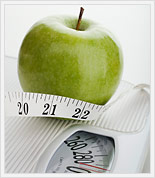 |
Already a member? Secure Login
|

- Ideal Weight Calculator
- Waist-to-Hip Ratio Calculator
- BMI Calculator
- Frame Size Calculator
- Target Heart Rate Calculator

- Good Fast Food
- Recipe Makeovers
- Meal Plans
- Nutrient Facts
- Food Label Claims
- Estimating Serving Sizes



Increasing Your Metabolism
QUESTION:
I have tried every diet in the book and am finally starting to educate myself on healthy weight loss. I think some of my diets probably hurt my metabolism. How can I naturally (no pills!) speed up my metabolism?
I have tried every diet in the book and am finally starting to educate myself on healthy weight loss. I think some of my diets probably hurt my metabolism. How can I naturally (no pills!) speed up my metabolism?
ANSWER:
 Good for you! Shifting your thinking from a "diet mentality" mode to one of health, nurturing and self-care can be difficult in a society that is so entrenched with the pursuit of thinness at all costs. However, it is a necessary step and one that will ultimately enable you to achieve long-term success.
Good for you! Shifting your thinking from a "diet mentality" mode to one of health, nurturing and self-care can be difficult in a society that is so entrenched with the pursuit of thinness at all costs. However, it is a necessary step and one that will ultimately enable you to achieve long-term success.You are right to suspect that dieting may have decreased your metabolism. Severe caloric restriction is a form of starvation and subsequently teaches the body to adjust accordingly for the next self-imposed famine by decreasing metabolism. As your resting metabolic rate is often the largest part of total energy expenditure, this is a major concern. Refer to Recipe for Weight Loss to learn more about why and how the body decreases metabolism in response to extreme food restriction.
Nonetheless, it is never too late to re-establish a more desirable metabolic rate through good nutrition and regular exercise. You are right to avoid over-the-counter diet pills as they are unregulated and often contain dangerous ingredients such as ephedrine, which is now banned by the U.S. Food and Drug Administration. There are many things that you can do to safely increase your metabolism from a depressed state. The most important strategy is to minimize your caloric deficit at this point in time. This means slowing your weight loss down or even maintaining your weight for the next month or two. Don't dismay, however, this doesn't mean that big things aren't happening! The goal during this time is to improve your body composition through exercise and to reset metabolic controls. In other words, get your body to trust that there is food coming and that you're going to meet its energy needs through food intake. Once this has been established you can re-start a small caloric deficit of 500 Kcal per day, which translates into a pound a week.
Exercise is a must to re-kindle that internal fire known as metabolism. Slowly work up to at least 30 minutes or more of moderate to intense exercise on most days of the week. Also increase general activity throughout the rest of the day through activities such as short walks, housework, gardening, taking the stairs, etc. And don't forget your strength training at least twice a week - this is imperative for re-building your muscle mass that was depleted during dieting! In addition to the positive influences on muscle mass, exercise also gives your metabolism a slight boost through a process called "excess post-exercise oxygen consumption" or EPOC. During this post-exercise period, your body is working to equilibrate imbalances that occurred during exercise, and this takes energy.
Make sure that you are eating enough calories during this re-adjustment period. You need to keep throwing wood on that internal fire to keep it burning. If the above-mentioned exercise is more than you are used to doing, you will have to increase your food intake to meet these caloric demands. When you feel true hunger signals, you need to eat. Your body is telling you that it needs energy, so trust those internal cues. This can be difficult after years of denying those signals through dieting and imposing external rules and regulations on food intake. Consciously work on recognizing these innate cues. Never skip meals, and spread your food intake out during the day by incorporating snacks.
For information and motivation purposes, you may want to consider getting your resting metabolic rate (RMR) assessed. Although you can often get this tested in a fitness center or gym, a more accurate way is through universities or research centers that have exercise physiology research labs that offer this testing on validated equipment.
In summary:
- Maintain energy balance or at the very least, minimize caloric deficit to no more than 250 Kcal per day (1/2 lb per week)
- Aerobic exercise for 30 min or more on most days of the week
- Increase daily activities of living
- Strength training a minimum of 2 days per week
- Don't skip meals
- Incorporate snacks into your day
- Be patient - it takes a little time to undo the prior damage brought on by dieting.

Our expert, Dr. Sharon E. Griffin, holds a B.S., M.S., and Ph.D. in the areas of exercise science/physiology. She also holds a second M.S. degree in Nutrition and is a licensed nutritionist and an ACSM certified health and fitness instructor.
© 2025 MyFoodDiary.com. All Rights Reserved.